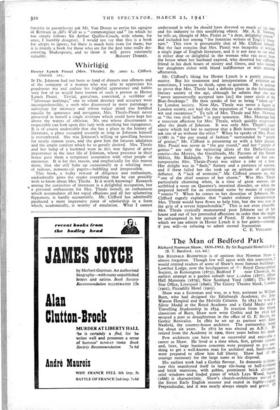W h irligig Hester Lynch Piozzi (Mrs. Thrale). By James L. Clifford.
(Oxford. 2I5.) IF Dr. Johnson had not been so fond of dinners and idleness and of the company of a woman who was able to appreciate his ponderous wit and endure his frightful appearance and habits very few of us would have known of such a person as Hester Lynch Piozzi. Trivial, garrulous, conceited, a scribbler of " laborious nothings," one to whom decency and accuracy were incomprehensible, a snob who discovered in mere patronage a substitute for intimacy and whose vulgar mind was fortified equally by ignorance and arrogance, Mrs. Thrale-Piozzi never possessed in herself a single attribute which could have kept her above the waters of oblivion. No one whose discernment is respectable can look upon this lady with anything but repugnance. It is of course undeniable that she has a place in the history of literature, a place occupied securely as long as Johnson himself is remembered. She was Johnson's willing or unwilling hostess for nearly sixteen years, and she gave him the fatuous adulation and the ample comfort which he so greatly desired. Mrs. Thrale and her lump of a husband were in this way figures of great importance in the later life of Johnson, whose presence in their house gave them a temporary association with other people of eminence. It is for this reason, and emphatically for this reason alone, that she still bobs up occasionally in a whirling mass of tedious, nonsensical papers—babbling and irrepressible.
This book, a bulky reward of diligence and enthusiasm, undoubtedly gives the reader everything that he can possibly wish to know about Mrs. Thrale. Is it worth knowing? Research among the curiosities of literature is a delightful occupation, but a personal enthusiasm for Mrs. Thrale herself, an enthusiasm which accumulates all her vapid effusions and all her spluttering flippances, is hardly accountable. Mr. Clifford has admittedly produced a most impressive piece of scholarship in a form which, academically, is worthy of emulation. What I cannot
understand is why he should have devoted so much of his time and his industry to this unedifying object. Mr. A. E. Newton, he tells us, thought of Mrs. Piozzi as " a dear, delightful person* and included her among " the feminine writers of English litera- ture." This view is presumably that of Mr. Clifford himself But the fact remains that Mrs. Piozzi was incapable of writing a single page of English literature, and it is not easy to see what is either dear or delightful in the woman who ran away from the house when her husband expired, who deserted her suffering friend in his dark hours of misery and illness, and who treated her daughters either with bland indifference or with mincing 'affectation.
Mr. Clifford's liking for Hester Lynch is a purely personal matter. But his treatment and interpretation of evidence are sometimes, I venture to think, open to question. He is anxious to prove that Mrs. Thrale had a definite place in the fashionable literary society of the age, although he admits that she was " never unreservedly accepted into [sic] the inner circle of the Blue-Stockings." He then speaks of her as being " taken up " by London society. Now Mrs. Thrale was never a figure in London society, nor had she the reputation of " an acknowledged wit and raconteuse." To talk of Mrs. Thrale and Mrs. Montagu as " the two rival ladies " is pure nonsense. Mrs. Montagu had a transient affection for Mrs. Thrale, which quickly evaporated after the death of Johnson. It was only Mrs. Thrale's eager vanity which led her to suppose that a Bath hostess " could not ask one of us without the other." When he speaks of Mrs. Piozzi (1788) in " the gay round of fashion " surrounded by " people of genius," Mr. Clifford is presenting us with a false picture. Mrs. Piozzi was never in " the gay round," and her " people of genius " are only the twittering idiots of the Della-Cruscan coterie—the Merrys, the Greatheeds, Mr. Parsons of the Sussex Militia, Mr. Biddulph. To the greater number of her con- temporaries Mrs. Thrale-Piozzi was either a joke or a bore. Her delight was in " flash," flattery and a pretence of renown, and if these failed her she took up an attitude of quivering defiance. A " lack of restraint," Mr. Clifford assures us, was " one of the chief sources of her charm." Was Mrs. Thrale particularly charming when, in a time of great sorrow, she scribbled a verse on Queeney's intestinal disorder, or when she prepared herself for an emotional scene by means of copious " vomits "? When he comes to her desertion of Johnson, Mr. Clifford eagerly explains that " under ordinary circumstances Mrs. Thrale would have flown to help him, but she was now in the grip of a severe hypochondria." This is not even plausible. Mrs. Thrale cynically manoeuvred poor Johnson out of her house and out of her pretended affections in order that she might be unhampered in her pursuit of Piozzi. If there is anything which we can admire in Hester Lynch it is her gaiety—courage, if you will—in refusing to admit eternal frustration.
C. E. VULLIAMY.






































 Previous page
Previous page